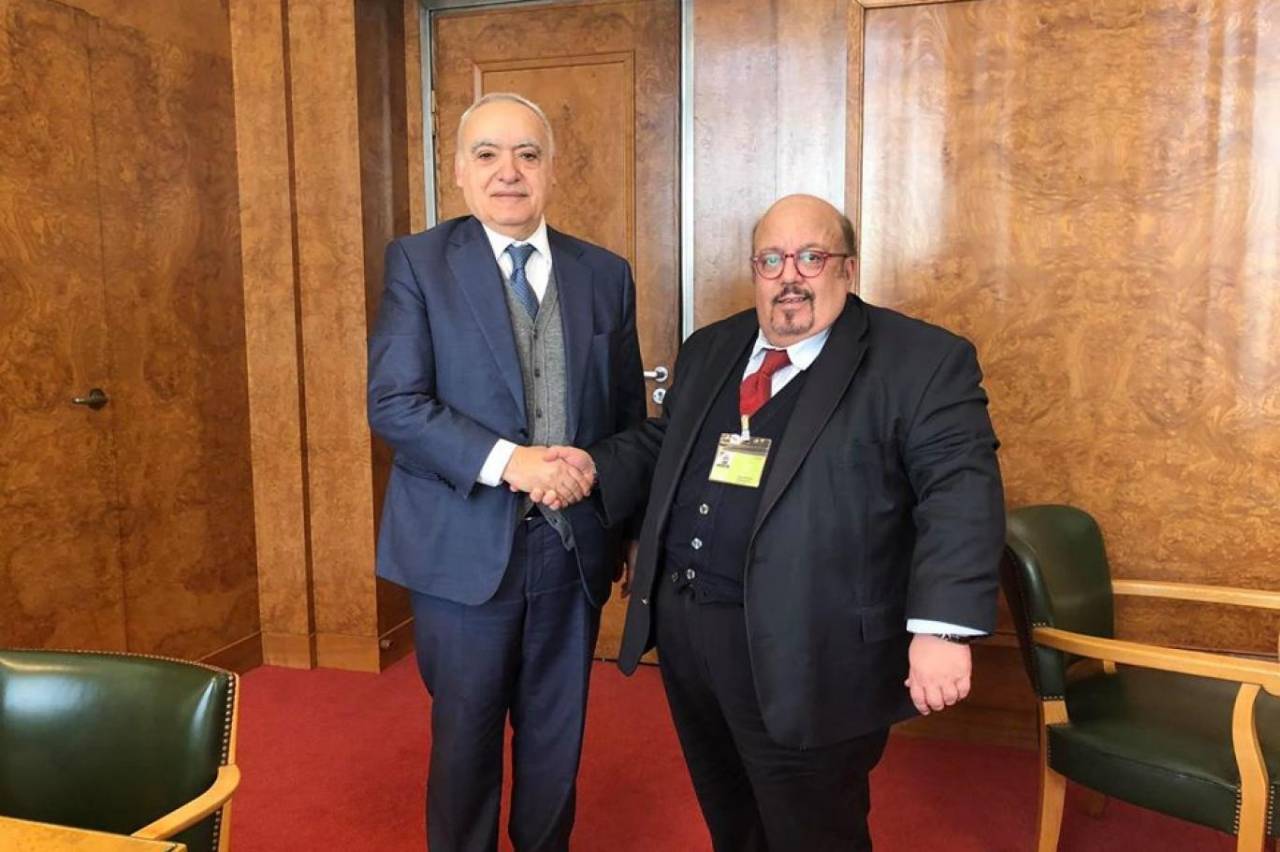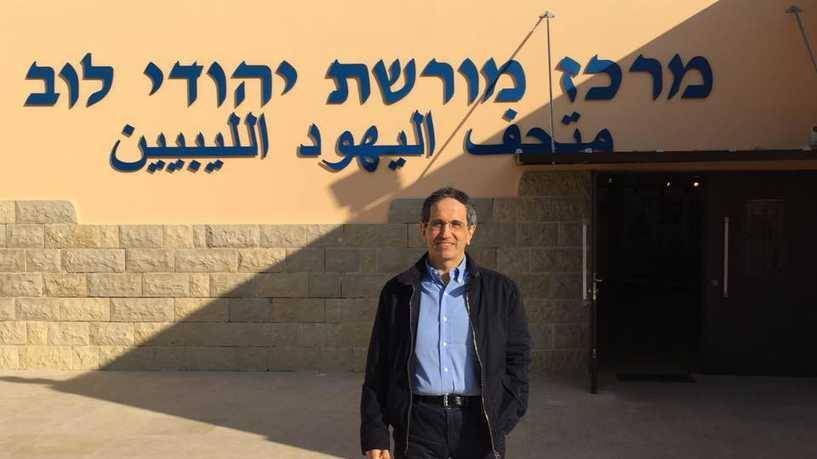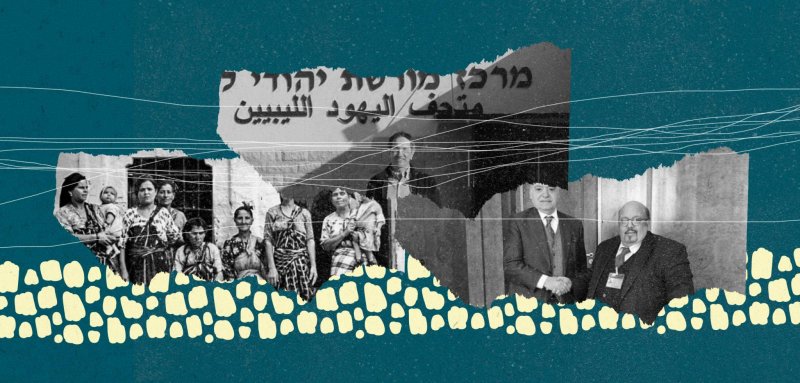The meeting between the Chairman of the Union of Libyan Jews, Raphael Luzon, and the UN envoy to Libya Ghassan Salamé in Geneva has revived the controversy over whether Libyan Jews have the right to official recognition regarding their identity, as well as obtain their full political rights as Libyan citizens, following decades of exclusion and neglect, while the oppressive military and political conflicts on the public scene keep their issue distant from the discussion table.

Ghassan Salamé and Raphael Luzon - Social media sites
The suffering of Jews in Libya began blatantly in conjunction with the 1948 war. Jews were required to obtain special permits to prove their identity, as the persecution and targeting began to intensify and escalate with the defeat of the Egyptian army and the loss of Sinai in 1967. At the time, things had become unbearable in Libya, and so the leader of the Jewish community submitted a written request to the Libyan government requesting that Jews be allowed to leave the country until things calmed down. But the situation deteriorated further and things came to a head on October 7, 1970, when the Day of Revenge (the holiday celebrating the expulsion of the Jews and Italians) was declared, and Libya became off-limits to Jews.
The meeting between the Union of Libyan Jews and the UN envoy to Libya revived controversy over Libyan Jews’ right to official recognition of their identity and full political rights as citizens, following decades of exclusion.
Reaching out to interested groups
As the winds of change began to blow during Arab Spring, conversations began to revolve around Libyan Jews who left in various stages for different reasons, and so the idea of a “right of return” to Libya came to surface.
In October 2011, the executive director of the World Organization of Libyan Jews, David Gerbi, went to Tripoli to visit the Dar Bishi Synagogue in the old city, but he was met with a crowd that had gathered there carrying banners that read: “There’s no place for Jews in Libya,” and had to leave as a result. He then made a statement saying that the Jews of Libya are demanding an apology and compensation, and that despite all the challenges they still have hope.

David Gerbi - Social media sites
At a time when Libyan Jewish organizations were seeking to recover their rights, actors within the Libyan political scene were turning east towards Israel. The Israeli newspaper Haaretz published a story about a visit by Khalifa Haftar’s son to Israel on November 1, 2021 with the aim of strengthening diplomatic relations between the two countries. The newspaper did not fully clarify the agenda behind the visit, but it did speak of expected support during the course of the elections that were set to be held on December 24 of last year.
On the other hand, the Palestinian Acre website, quoting Israeli radio, published news about a meeting that brought together the Prime Minister of the Government of National Unity (GNU), Abdul Hamid Dabeibeh, with Israeli officials in Amman with the aim of normalizing relations between the two countries.
Raseef22 spoke to Attia al-Barqawi, a member of the Libyan Jews Committee in the Italian capital Rome, he said, “We met with members of the Libyan government from the days of Fayez al-Sarraj (former Prime Minister of the Government of National Accord), Abdul Hamid Dabeibeh (current head of the interim government), and Khalifa Haftar (commander of the Libyan army). The problem is that in Libya there is no steady government that we can ask for our full rights from as Libyans.”
Al-Barqawi concluded his chat saying, “There are more than five thousand Libyan Jews who dream of returning to their country and of enjoying their full rights.”
Timing isn’t right
The demands to reopen the Jewish file now raises serious questions about the ability of Libyans to do so, especially since the country is still reeling from the grip of political division, in addition to security divides, in light of the failure to expel mercenaries, unify the military, and other challenges.
On another front, there is a degree of public rejection regarding the return of Jews, which is the result of confusion between the Jewish faith and the Hebrew state.
Last December, the “Ala Bayad” program hosted Raphael Luzon, Chairman of the Union of Libyan Jews. The show discussed several topics with him, including of course the “right of return”, which was met with strong reactions on social media. The majority of commentators firmly rejected any sort of presence of Jews in Libya, consistent with the extremist Islamist expansion in Libya.
Representative in the Libyan Parliament, MP Jibril Ouhaida believes that the country is not ready at the moment, to open the Jewish file or even the files of other minorities, whether they are religious or ethnic in nature.
In a statement to Raseef22, Ouhaida stresses, “In light of this fragile situation, I am against raising such issues. When the state becomes stable, when it has a constitution, when its security stabilizes, and when it gets rid of foreign interference, then there’s no problem raising this issue.” The MP concludes with the words, “We do not need to raise these problems now.”
The demands to reopen the Jewish file now raises serious questions about the ability of Libyans to do so, especially since the country is still reeling from the grip of political division, as well as security divides
Ready to help
Faced with the refusal to even address the issue, representatives of Libyan Jews stress that they are ready to deal with any government that is directly and freely elected by the Libyan people. Here, Attia Al-Barqawi says, “We are ready to stand with any government, provided that it is elected by the Libyan people. We can possibly help Libya, but not the opposite.”
The efforts made by the Libyan Jewish community in the world do still have a noticeable impact, at least on the local level, but the real impact on decision-making is still not clear, especially since Libyan political work and action is floundering and almost non-existent. We may see a real return after some years, but in the public discourse at the moment, the issue is a closed taboo that’s difficult to delve into.
Raseef22 is a not for profit entity. Our focus is on quality journalism. Every contribution to the NasRaseef membership goes directly towards journalism production. We stand independent, not accepting corporate sponsorships, sponsored content or political funding.
Support our mission to keep Raseef22 available to all readers by clicking here!
Interested in writing with us? Check our pitch process here!



